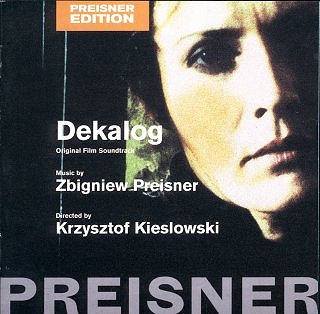It is rare that a style of film music which is both distinctively new and of value appears. Such was the case, for those of us outside Poland, with the arrival of Krzysztof Kieslowski's television series, Dekalog (1987). For those unfamiliar, Dekalog was a series of television films set in an apartment block in contemporary Warsaw and based very loosely around the Ten Commandments. Two of the dramas, which ran around an hour each, were expanded to feature length and released internationally. Dekalog V - Though Shalt Not Kill became A Short Film About Killing, and made quite a splash on the arthouse circuit, while Dekalog VI - Thou shalt not commit adultery reached a handful of cinemas as A Short Film About Love. Dekalog has played three times on BBC television and in the UK is probably the second most successful European TV subtitled drama series import after Das Boot (1981).
The ten films are stark, spare and photographed with an austere beauty. Perfectly complimenting this style is the highly distinctive music of Zbigniew Preisner, a Polish composer who was born in 1955 who made his feature debut with Prognoza Pogody (Weather Forecast) (1981) before collaborating for the first time with Krzysztof Kieslowski on the 1985 feature Bez Konca (No End). While certainly not attracting mainstream box-office success or becoming a popular peak-time television event, Dekalog brought both director and composer to attention of serious critics and thoughtful audiences. Many people noticed the music, and realised that it was an integral part of the entire design (not withstanding that the final part, Dekalog X has no original score). Since then Preisner has gone on to become the most distinctively original new European film composer of the 1990s. He has been showered with awards and sold an astonishing number of albums - over 700 000 copies of the soundtracks for Kieslowski's Three Colours cinema trilogy.
What made, and still makes Preisner's Dekalog so striking is a direct melodic sensibility akin to folk music coupled with an orchestration and recording which is beautifully clean, clear, simple and detailed, yet replete in spectral atmosphere. The present CD, which in running 52 minutes is presumably contains the same selection of tracks as the original LP, offers extracts from the scores of each episode. There are 25 tracks on the album, and as the original cues are not titled, only numbered, we can see how little of the scores are present. For example, Dekalog IX is represented by cues 3, 7, 12 & 13. The selections have been made with great skill to produce an evocative, imaginative and haunting album which one can recommend without hesitation. However, to fully appreciate how motifs and textures recur and develop a more comprehensive multi-disc set would be required and perhaps a three disc set may be a possibility in the future. (This current album is part of Silva Screen's Preisner Edition which so far also includes
Aberdeen,
The Last September,
and Weiser).
Throughout the score Preisner knows that the space between the notes and the space around his musicians is as important as what is played, or to put it conventionally "less is more". Thus while he has a symphony orchestra at his disposal he does not feel impelled to use it, or use all of it, all the time. As often as not a single instrument will play. The album opens with an exceptionally haunting, long and flowing melody on the recorder played by Jacek Ostaszewski, whose musicianship would become a central feature of Kieslowski's finest feature film, La Double Vie de Véronique (1991). Elsewhere it may be a piano or harp, alone or over the most spare yet telling accompaniment. When Preisner uses massed strings it can to almost overwhelmingly intense effect, as demonstrated by the building tension of "Dekalog VIII - part 4".
One other feature which would become familiar over the years is the soprano of Elzbieta Towarnicka, her voice bringing a rich humanity to Preisner's often ghostly musical world in the La Double Vie de Véronique, the Three Colours trilogy and various other projects. Here she makes an indelible impression in the cues from Dekalog IX - Thou shalt not covet thy neighbour's wife.
Excepting one very brief instance of distortion, the sound throughout is absolutely pristine, the recording both highly detailed and exceptionally atmospheric. Combining these two qualities is of course quite an achievement. The score is unforgettable, a rare landmark in film (or to be pedantic, television) music. It marked the coming of age of the most individual and creative new European film composer of the last two decades and is perhaps the most groundbreaking, yet still accessible and melodic, film music achievement of the 1980's. This album belongs in every serious film music collection, and if you only ever buy one Preisner release, this is the one it should be.
Gary S. Dalkin

